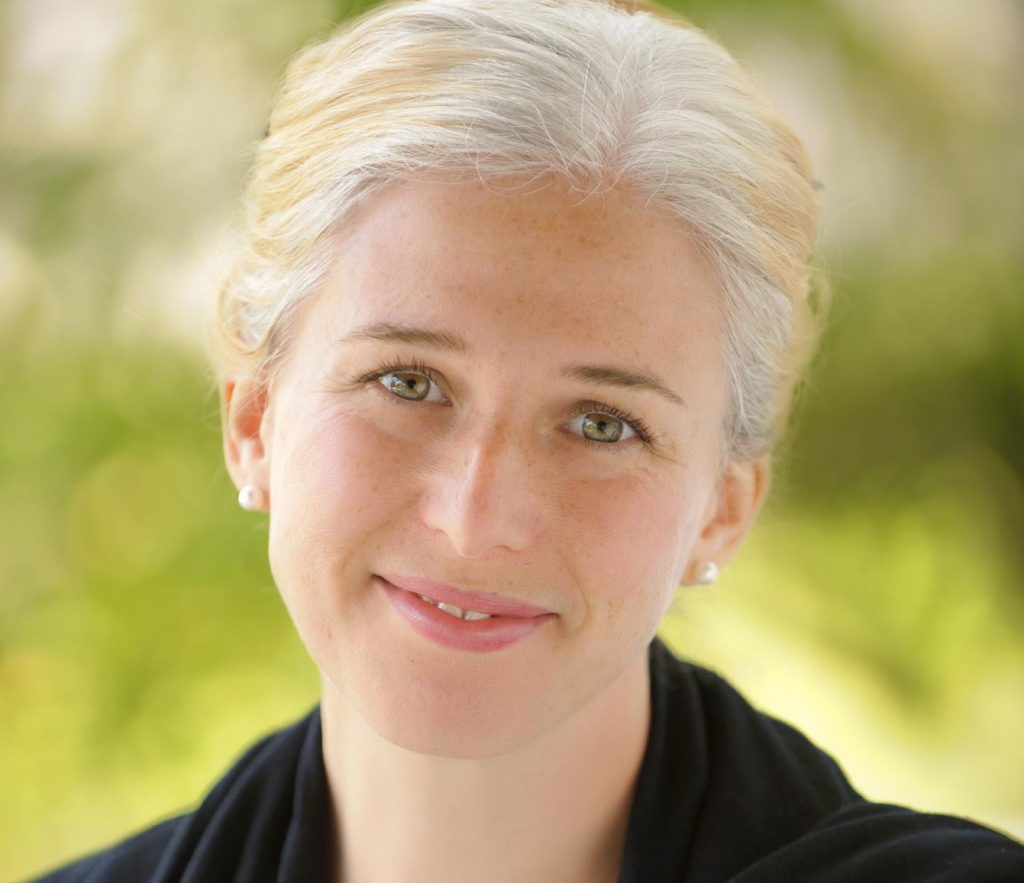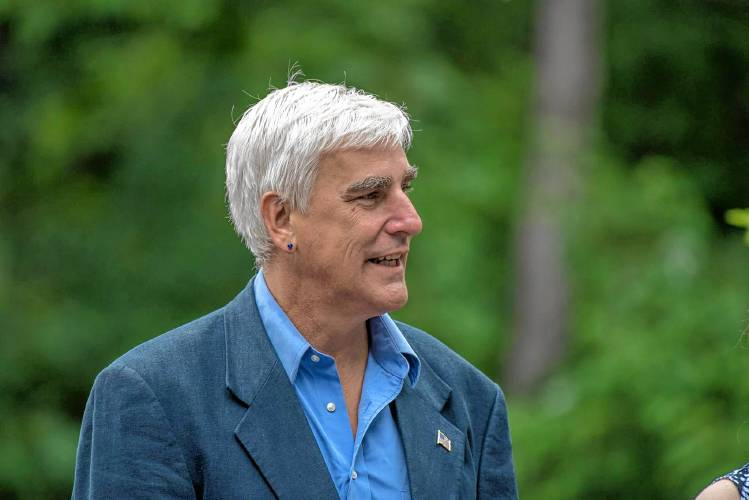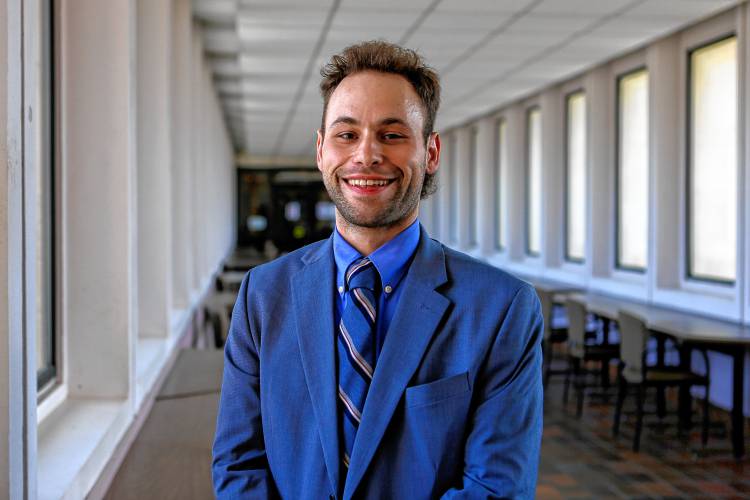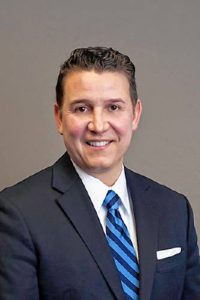The five write-in candidates in the race to replace longtime state Sen. Stanley Rosenberg, of Amherst, are coming under scrutiny for their late entry into the race, with some calling their challenge to progressive Chelsea Kline — the only candidate to have her name on the ballot — sexist.

Clockwise from top left, state Senate candidates Steven Connor, Chelsea Kline, Ryan O’Donnell, David Murphy, David Morin, and Jo Comerford. Only Kline will appear on the ballot on Sept. 4.
Rachel Gordon, a Greenfield resident who is campaign manager for 1st Franklin House district candidate Francia Wisnewski, said she is dismayed at the number of write-in candidates.
“For a lot of people, among them many feminists, there was a lot of frustration at what seemed to be a wave of men jumping in to take out the woman the minute they thought they had an opportunity,” Gordon said, adding that her views are her own and not associated with Wisnewski’s campaign.
Four of the five write-in candidates are men — Ryan O’Donnell and Steven Connor, of Northampton; David Murphy, of Newton; and David Morin, of Amherst. Jo Comerford, of Northampton, is the only woman to launch a write-in campaign.
All six candidates are Democrats seeking to win that party’s primary election Sept. 4. There are no announced Republican or unenrolled candidates.
Gordon said she views the entry of so many male write-in candidates as problematic because only about 25 percent of the state legislators are women. In addition to a candidate who supports progressive causes — including single-payer health care, 100 percent renewable energy in the state, and equitable funding for public education — Gordon also wants to vote for a woman who will help balance gender equity in the Legislature.
“At this point, as a feminist progressive voter, if I can vote for a woman, I will over a man who is just as progressive,” Gordon said.
Resignation after deadline
Rosenberg resigned May 4 after a Senate ethics investigation determined that he should have known about his now-estranged husband Bryon Hefner’s pattern of “disruptive, volatile and abusive” behavior and that he failed to protect the Senate from Hefner.
Rosenberg resigned three days after the deadline to submit nomination signatures to secure a spot on the state primary ballot. Only Kline filed the necessary signatures by the May 1 deadline.
When several other candidates soon jumped into the race, Sarah Buttenwieser, of Northampton, said she felt some conflict in wanting to see a rigorous debate for an open seat, but also questioning whether the same number of write-in candidates would have emerged if it had been a male candidate challenging Rosenberg.
“It was hard not to feel that people thought, ‘This doesn’t count as enough because she’s a young woman who hasn’t been in public office before,’” Buttenwieser said. “That felt bad to me and continues to feel bad for me.”
Buttenwieser said she supports Kline, and that both Donald Trump’s election and the #MeToo movement have made her more resolved to support women in politics and beyond.
Joe Kopera of Montague said he is skeptical of the candidates who filed only after Rosenberg resigned.
“Why can’t western Mass. Democrats rally behind the only candidate who did their homework and did the work to run against an incumbent?” he said.
Kopera said that his fellow white men should step back this election cycle rather than running against qualified women candidates. “If you are committed to this progressive cause, just step aside,” he said.
‘A qualification thing’
Jonathan Hite, of Amherst, said he supports O’Donnell, the Northampton City Council president who he described as young, energetic and thoughtful, with good stances on policies.
Hite said he supports other women running for different offices this year, including Natalie Blais for the 1st Franklin House seat being vacated by retiring Rep. Stephen Kulik.
“It’s not a men vs. women thing; it’s a qualification thing,” Hite said. “I think Ryan is qualified; I think Jo Comerford is qualified. Steve Connor is qualified. I don’t think Chelsea Kline is qualified.”
Hite said he has been a friend of Rosenberg for 40 years, and found Kline’s entrance into the race before Rosenberg resigned to be opportunistic and lacking in decency and respect for the former senator.
But Jennifer Taub, of Northampton, who teaches at the Vermont Law School in South Royalton, Vermont, points out that challenging incumbents may be the only chance women or members of minority groups have to be elected to a state office held mostly by white men.
“It can be a catch-22 for underrepresented groups,” she said. “They can be seen as trying to rock the boat, but that is the only way to achieve any kind of gender balance.”
A December WBUR analysis of the historical gender makeup of the state Legislature found that women made a good deal of progress between 1970 and 2002, jumping from 3 percent to 26 percent of the legislative body. But since that time, progress has stalled, and female representation on Beacon hill remains at about a quarter. Women can win elections when they run, but they have few opportunities to do so when male incumbents hold their seats for 20 and 30 years, according to the WBUR report.
Taub said that leadership organizations are encouraging women to challenge sitting lawmakers in Democratic primaries, which can be a difficult decision, especially if the incumbent is doing a good job. She has not made up her mind who she will support in the state Senate race, but she is leaning toward Kline.
“One of the things we need in addition to experience is the willingness not to be afraid to challenge those in power,” Taub said.
Inappropriate behavior
One of the candidates, Murphy, came under scrutiny following a social media post from Kline saying he had made comments about her appearance and touched her back and shoulder without permission.
Kline said she was frustrated when Murphy focused on her appearance in their conversation and seemed to have no knowledge of her professional experience.
“He thought I was worth challenging but he didn’t know what I did for work,” she said. “He didn’t know anything about me.”
Kline said she was glad Murphy reached out to her afterward and they had a productive conversation where she invited him to be an ally and work toward changing the culture around gender dynamics.
“I spoke with Chelsea and we had a very pleasant conversation,” Murphy said. “I apologized if I offended her and she accepted my apology. It was never my intention to offend her. I try to be polite and respectful to everyone.”
Daniele Letourneau of Greenfield said that a big problem is that men are often unaware that they are acting inappropriately.
“These guys don’t think they are doing anything wrong,” Letourneau said. “The problem isn’t that this one guy said this one thing. Systematically we raise men in this country that this is OK and they get bewildered because they don’t think there’s anything wrong with this.”
Why they are running
Kline, a director of multiple higher education programs at Bay Path University, said she was motivated to run because of her skills and background. She said she was shaped by her history as a single parent living on food stamps and as a non-traditional student who went on to graduate from Smith College and Harvard Divinity School.
“I’m excited to tell my story again and again because the experiences I have had are generally invisible,” she said.
She said women are often not encouraged to run for elected office, and that the traditional view of what the “right experience” is to run for office is inherently gendered.
Kline said lacking money and being broke at a young age created barriers to the traditional path of running for school committee or city council, and that is the case for many women who live in poverty and who don’t have access to child care.
“So I became an activist,” she said. “It comes from the same place of seeing problems and wanting to be part of the solution, seeing vulnerable people being hurt by the system.”
The two male candidates — O’Donnell and Connor — who had been running for the state representative seat held by Peter Kocot, who died in February, both announced on May 7, that they would switch to the state Senate race.
By the following day, Murphy, a Newton attorney who grew up in Amherst but has not lived in the district since the 1990s, also threw his hat in the ring.
MoveOn Campaign Director Comerford declared her candidacy on May 21.
The final candidate, Morin, a University of Massachusetts Amherst graduate assistant, had pulled papers to run for the seat in March, but he did not submit them. He finally declared his candidacy May 24.
O’Donnell, who was elected to Northampton City Council in 2013 and now serves as its president, said he decided to switch to the state Senate race because he wanted to offer his experience at a time when the region is losing a lot of combined legislative experience.
“I grew up in Amherst and I represent Northampton and I have ties to Franklin County,” he said. “This part of the world is honestly very important and even sacred to me, and I just care a lot about it and I think we haven’t had a contested election for this seat for a long time.”
He said he believes that the state Legislature and all democratic institutions need to be more reflective of women, people of color, and people who don’t have access to wealth, and he pointed to his work on public financing of campaigns as a way to make that a reality.
Asked whether he considered stepping aside and supporting a woman in the race, O’Donnell said said with his experience, he believed stepping forward and running was the right choice.
Connor, director of Central Hampshire Veterans’ Services in Northampton, said he came at politics as a result of taking graduate courses at UMass in public policy.
“I’m running into the race because I worked with families to solve problems and I just want to continue the same work with the same people, but do it from the inside instead of always from the outside,” he said.
As for switching races, Connor said his children went to school and summer camp in Franklin County and he works as the veterans service officer in Northampton. He said he did not want to run against Rosenberg because of the help the former senator provided him both professionally through his advocacy for veterans and personally through constituent services. When Rosenberg was no longer running, he made the switch despite having to run a write-in campaign against Kline.
“She played by the rules, she did her thing, and she got onto the ballot,” Connor said. “In a sense she has an advantage over the rest of us because she’s on the ballot, and you know what, she deserves that advantage.”
He said he believes there should be more women in the Legislature, and that the timing of his run for office may not be great, as it coincides around a lot of energy to get more female legislators elected.
Murphy said that as someone with experience working on Beacon Hill, he could make up for the fact that Hampshire County would not have longtime legislators Kocot, Kulik, retiring South Hadley Rep. John Scibak, and Rosenberg representing it.
“After deliberation, I decided that it was important for me to enter the race because I believe I have the qualifications necessary to ensure the district is taken care of on Beacon Hill,” Murphy said.
Murphy, who was adopted from the country of Colombia, said he believes it is important for government to reflect the society that elects it, including women and minorities. He said the most important thing is to elect people committed to equality, justice, and opportunity for all people.
Comerford said it was respect for Rosenberg’s record that kept her from challenging him. She said she also wanted to support Rosenberg in rebuilding his power.
“When Stan stepped aside, I was approached again by a number of people and had to ask myself if there was something I could offer to the Hampshire, Franklin, Worcester district, and my answer was yes,” she said.
Comerford said her years of service work in areas of homelessness, education, and women and child related issues have given her direct experience in the state system and would make her a great advocate for constituents. She has also done work looking at state, local, and federal budgets.
Morin said he decided to join the race after reflecting on his own readiness and evaluating the field of candidates. He said that the field lacked a high-profile candidate, such as Northampton Mayor David Narkewicz, and he believes he can win.
While he said it is important to elect more women to the Legislature, he said the job of a senator is to vote based on the needs of the commonwealth regardless of gender, race, and other factors.
“I didn’t choose to be a male. I’m just running on who I am and not on percentages or statistics,” he said. “The gender of my opponents is not an issue for me.”
A move to get women elected
Alexandra Russell of Northampton works in progressive philanthropy with individual donors and foundation funders on voting rights and progressive voting politics. She is also on the advisory board of the Leadership Institute for Political and Public Impact (LIPPI) with the Women’s Fund of Western Massachusetts and a founding board member of Emerge Massachusetts, both organizations that work to assist women in getting into leadership roles.
“As to Chelsea, I think for her to step up and challenge a sitting male incumbent who had been in for decades was brave and courageous, and probably was not something the party establishment was in favor of,” Russell said. “This is a moment for women in politics and for women to reclaim our time and get in the game more than we ever have before.”
Russell sees this moment as one of opportunity for women in western Massachusetts with so many open seats, including the state Senate race, but also three open house seats in Hampshire and Franklin counties.
“We know that women legislate differently and are more collaborative, and it is time to see what that could really look like,” Russell said. “In Massachusetts we still have a long way to go in parity for women and people of color.”
Russell said that Massachusetts is less progressive than it could be due to an old-boy network including consistently re-elected incumbents, many of whom are white men. And she thinks there is a desire to change that.
“At this point I really think it is a race between the two women and women are hungry for women’s leadership,” Russell said.
Dave Eisenstadter can be reached at deisen@valleyadvocate.com.
















